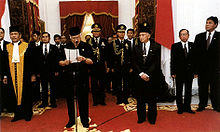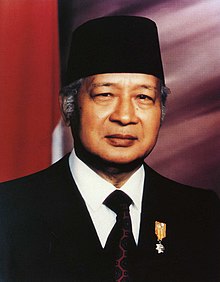Resignation
The Asian Financial Crisis had dire consequences for the Indonesian economy and society, and Suharto's regime. The Indonesian currency collapsed in value, foreign investment dried up, and mass layoffs of urban workers and price rises created tension across the country. Suharto was re-elected for another five-year term in March 1998, stacking parliament and cabinet with his own family and business associates in the process. Increasingly, prominent political figures spoke out against Suharto's presidency, and university students organised nation-wide demonstrations.
The shooting of four student demonstrators in Jakarta in May 1998 triggered rioting across the city that destroyed thousands of buildings and killed over 1,000 people. Following public outrage at the events, a student occupation of the parliament building, street protests across the country, and the desertion of key political allies, on 21 May 1998 Suharto announced his resignation from the presidency. His recently appointed Vice President Habibie assumed the presidency in accordance with the constitution.
 |
| Suharto reads his address of resignation at Merdeka Palace on 21 May 1998. Suharto's successor, B. J. Habibie, is to his right. |
Investigations of wealth
In May 1999, Time Asia estimated Suharto's family fortune at US$15 billion in cash, shares, corporate assets, real estate, jewelry and fine art. Of this, US$9 billion is reported to have been deposited in an Austrian bank. The family is said to control about 36,000 km² of real estate in Indonesia, including 100,000 m² of prime office space in Jakarta and nearly 40% of the land in East Timor. Suharto was placed highest on Transparency International's list of corrupt leaders with an alleged misappropriation of between US $15–35 billion during his 32-year presidency.
On 29 May 2000, Suharto was placed under house arrest when Indonesian authorities began to investigate the corruption during his regime. In July 2000, it was announced that he was to be accused of embezzling US$571 million of government donations to one of a number of foundations under his control and then using the money to finance family investments. But in September court-appointed doctors announced that he could not stand trial because of his declining health. State prosecutors tried again in 2002 but then doctors cited an unspecified brain disease. On 26 March 2008, a civil court judge acquitted Suharto of corruption but ordered his charitable foundation, Supersemar, to pay US$110 m (£55 m).
Related legal cases
In 2002, Suharto's son Hutomo Mandala Putra, more widely known as Tommy, was sentenced to 15 years jail. He had been convicted of ordering the killing of a judge who had sentenced him to 18 months jail for corruption and illegal weapons possession. In 2006, he was freed on "conditional release." following reductions in his sentence.
In 2003, Suharto's half-brother Probosutedjo was tried and convicted for corruption and the loss of $10 million from the Indonesian state. He was sentenced to four years in jail. He later won a reduction of his sentence to two years, initiating a probe by the Indonesian Corruption Eradication Commission into the alleged scandal of the "judicial mafia" which uncovered offers of $600,000 to various judges. Probosutedjo confessed to the scheme in October 2005, leading to the arrest of his lawyers. His full four-year term was reinstated. After a brief standoff at a hospital, in which he was reportedly protected by a group of police officers, he was arrested on 30 November 2005.
On 9 July 2007, Indonesian prosecutors filed a civil lawsuit against former President Suharto, to recover state funds ($440 m or £219 m, which allegedly disappeared from a scholarship fund, and a further $1.1 billion in damages).
On 4 September 2007, mediation at the Attorney General's Office (AGO) between prosecutors and lawyers for Suharto over the Supersemar foundation civil lawsuit succeeded and thus the trial will have to commence.
On 10 September 2007, Indonesia's Supreme Court awarded Suharto damages against Time Asia magazine, ordering it to pay him one trillion rupiah ($128.59 million). The High Court reversed the judgment of an appellate court and Central Jakarta district court (made in 2000 and 2001). Suharto had sued the U.S.-based Time magazine seeking more than $US 27 billion in damages for libel over a 1999 article which reported that he transferred stolen money abroad.
Health crises
After resigning from the presidency, Suharto was hospitalised repeatedly for stroke, heart, and intestinal problems. His declining health negatively affected attempts to prosecute him on charges of corruption and human rights violations as his lawyers successfully claimed that his condition rendered him unfit for trial. Moreover, there was little support within Indonesia for any attempts to prosecute him. In 2006, Attorney General Abdurrahman announced that a team of twenty doctors would be asked to evaluate Suharto's health and fitness for trial. One physician, Brigadier General Dr Marjo Subiandono, stated his doubts about by noting that "[Suharto] has two permanent cerebral defects." In a later Financial Times report, Attorney General Abdurrahman discussed the re-examination, and called it part of a "last opportunity" to prosecute Suharto criminally. Attorney General Abdurrahman left open the possibility of filing suit against the Suharto estate."
Death
On 4 January 2008, Suharto was taken to the Pertamina hospital, Jakarta with complications arising from a weak heart, swelling of limbs and stomach, and partial renal failure. His health fluctuated for several weeks but progressively worsened with anaemia and low blood pressure due to heart and kidney complications, internal bleeding, fluid on his lungs, and blood in his feces and urine which caused a haemoglobin drop. On 23 January, Suharto's health worsened further, as a sepsis infection spread through his body.[89] His family consented to the removal of life support machines, and he died on 27 January at 1:10 pm.
Suharto's body was taken from Jakarta to the Giri Bangun mausoleum complex near the Central Java city of Solo. He was buried alongside his late wife in a state military funeral with full honours, with the Kopassus elite forces and KOSTRAD commandos as the honour guard and pallbearers and Commander of Group II Kopassus Surakarta Lt. Colonel Asep Subarkah. In attendance were the incumbent president, Susilo Bambang Yudhoyono as "Ceremony Inspector", and vice-president, government ministers, and armed forces chiefs of staff. Tens of thousands of people lined the streets to see the convoy. Condolences were offered by many regional heads of state, although certain regional leaders such as Helen Clark, the Prime Minister of New Zealand, boycotted the funeral, whereas Indonesia's President Susilo Bambang Yudhoyono declared a week of official mourning.
The End
From Wikipedia, the free encyclopedia



0 komentar:
Posting Komentar
Leave a comment